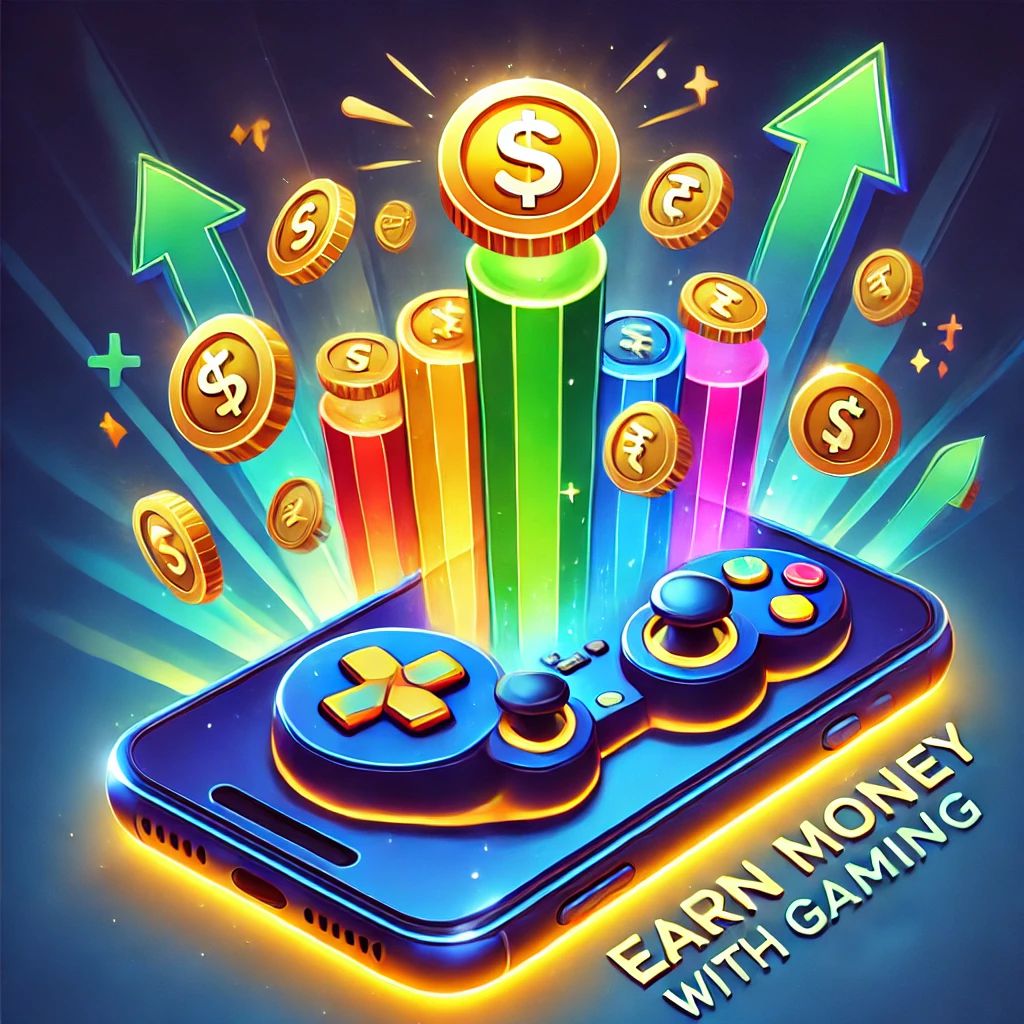With mobile gaming apps becoming a dominant force in the entertainment landscape, the gaming industry has experienced a seismic shift in recent years. Millions of people can now interact with interactive content at their fingertips thanks to the widespread use of smartphones & tablets, which have made gaming more accessible than before. This exponential rise in popularity has changed not only how people play games but also opened up a profitable market for business owners and developers. Gaming apps are a popular choice for both leisure and business because they offer a wide range of genres, from casual puzzle games to fully immersive role-playing experiences.
The allure of gaming applications is found in both their entertainment value and their potential for revenue generation. As players look for more and more captivating experiences on their devices, developers are taking advantage of this trend by making inventive games that have multiple revenue streams. The gaming app ecosystem offers a wide range of revenue streams, including in-app purchases & advertising. This article will examine the diverse realm of gaming applications, examining the ways in which people can profit from them, the methods that developers use to make money off of their works, and the platforms that make these transactions possible. We’ll also look at success stories that demonstrate the possibility of financial gain in this ever-evolving industry and speculate about future trends that might influence the monetization of gaming apps.
There are various ways to make money with gaming apps, and each one presents its own advantages for both players and developers. One of the most popular ways is through in-app purchases, which allow users to purchase in-app items or upgrades to improve their gaming experience. While offering a choice for those who would like to spend money on extra features or content, this model lets players play the game for free. This gives developers a consistent flow of income since they can keep releasing new upgrades or items to tempt players to spend money.
Finding the right balance between providing players with enough free content to keep them interested and convincing them to make purchases is crucial for success in this field. Using advertising in gaming apps is another way to make money. A lot of game developers opt to give their games away for free, making money from the gameplay or in-between-level advertisements. With a large user base, this strategy can be especially successful because even a few ad impressions can add up to a sizable revenue over time. To maximize revenue and optimize ad placements, developers can collaborate with ad networks that specialize in mobile gaming. Rewarded video ads are another feature of certain games; players can opt to view an advertisement in exchange for in-game rewards.
Because users can benefit while the creators make money, this not only increases user engagement but also creates a win-win situation for both players and developers. Gaming app developers use a wide range of monetization techniques, just like the games they create. Freemium models, in which the game is provided for free with optional premium features, are one common strategy.
By lowering the entry barrier connected with paid games, this tactic enables developers to draw in a wider audience. Players may be more likely to buy extra content or features once they become involved & invested in the game. Taking advantage of the psychology of gamers—who frequently have a willingness to part with money once they become attached to a game—this model has worked well for a number of well-known titles. Subscription-based models are another successful monetization strategy that has gained popularity recently.
With this method, users subscribe to a fee in order to access in-game features or premium content. In addition to giving developers a steady stream of income, this business model entices players to stick with the game & maximize their subscription. Developers can cultivate a dedicated community of players who are prepared to make gradual investments in their gaming experience by providing exclusive benefits & regular content updates.
For developers hoping to make a name for themselves and make a profit, creative monetization techniques will become increasingly important as the competition in the mobile gaming space heats up. Leading mobile gaming app marketplaces now include a number of platforms that give developers the resources and tools they need to efficiently develop & market their games. Two of the most well-known marketplaces, with sizable user bases & numerous revenue streams, are the Apple App Store and the Google Play Store.
Developers can customize their monetization strategies according to their target audience by using the different payment models that both platforms support, such as in-app purchases and subscriptions. These platforms also offer helpful analytics tools that aid in tracking user engagement and performance optimization for developers’ games. Independent developers aiming to reach specialized markets are increasingly using alternative platforms like Steam and itch.io in addition to the conventional app stores. Dedicated communities that value the work of creators can be reached through these platforms, which frequently cater to particular game genres or styles. Moreover, gaming features are now being integrated into social media platforms like Facebook and TikTok, giving developers direct access to users through these channels.
Developers are able to reach a wider audience and generate more revenue by utilizing these various platforms, which open up new markets for them to enter. A crowded market requires marketing and promotion in order for gaming apps to stand out. Creating a community around the game before it launches is one smart way to use social media. Excitement and anticipation can be created by interacting with potential players through interactive posts, behind-the-scenes content, and teaser trailers.
Also, working with streamers or influencers who already have a following can greatly increase exposure and credibility. Through these alliances, game developers can reach out to already-existing audiences & generate excitement about their titles, which in turn encourages downloads and user interaction. Using search engine optimization (SEO) strategies to improve app store listings is another essential component of marketing. While incorporating pertinent keywords that prospective players might use when searching for new games, developers should concentrate on creating captivating descriptions that highlight distinctive features. App store listings can be improved & downloads can be increased by using high-quality images, such as screenshots and promotional videos.
Seeking feedback and ratings from users can also boost the game’s legitimacy & entice new players. Developers can dramatically improve their chances of success in the cutthroat world of gaming apps by utilizing a multipronged marketing strategy that includes influencer relationships, social media engagement, & app store optimization. There are countless motivational success stories in the gaming app industry that show how people can make a sizable living off of their inventions. One such instance is Dong Nguyen’s Flappy Bird, which shot to fame almost immediately after its creation.
When it was released in 2013, the straightforward but incredibly addictive game quickly amassed millions of downloads and brought in a sizable sum of money from ad placements. Flappy Bird continues to be a testament to how one game can drastically alter someone’s financial situation, even though Nguyen himself removed it from app stores in the end due to intense pressure from its success. Brian Wong is the co-founder of Kiip, a mobile advertising platform that offers rewards to players who reach milestones in games. His story is also quite interesting. In addition to revolutionizing the way ads are incorporated into gaming experiences, Wong’s creative strategy has given developers new avenues for income when it comes to successfully monetizing their apps.
With an emphasis on adding value for both developers & players, Wong’s approach has improved user engagement across a wide range of games & enabled numerous people to make money with gaming apps. These success stories are potent reminders that anyone can make successful careers in the gaming app industry with imagination, hard work, and strategic thinking. The world of gaming app monetization is fast changing along with technology, at a rate never seen before. The incorporation of blockchain technology into gaming applications is one new trend that presents opportunities for ownership and revenue generation via non-fungible tokens (NFTs).
Developers can generate additional income streams and improve player engagement by offering ownership incentives by enabling players to purchase, sell, & exchange exclusive digital assets within their games. The way people interact with virtual worlds & make money from them could be completely changed by this shift in gaming toward decentralized economies. Also, new developments in artificial intelligence (AI) have the potential to change how gaming apps monetize.
Developers can better customize experiences and monetization strategies by gaining deeper insights into player behavior through AI-driven analytics. Higher conversion rates for in-app purchases or subscriptions may result from recommendations that are tailored to each user’s preferences. Leveraging AI technology will become increasingly important for developers looking to maximize their monetization efforts while producing captivating experiences that players connect with as the competition in the mobile gaming market heats up.
To sum up, there are a lot of options in the gaming app market for developers and users who want to make money while having fun with interactive entertainment. People can successfully traverse this dynamic landscape by being aware of emerging trends, utilizing well-known platforms, employing efficient marketing strategies, and comprehending different monetization strategies. Those who can adjust will surely find themselves at the forefront of this exciting evolution in mobile gaming as technology continues to advance and change the industry.




